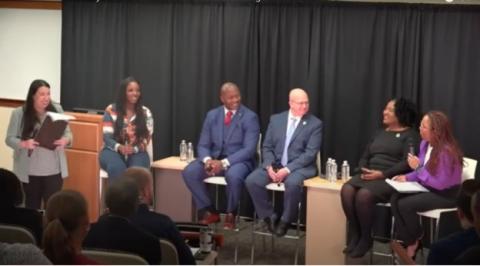A Conversation on the Culture of Policing: Participants Express Both Frustration and Hope
Why do incidents such as the deadly beating of Tyre Nichols by Memphis police officers continue to happen? How can communities work together to ensure this won’t happen in New Hampshire? Those were among the questions explored during a March event organized by the New Hampshire Center for Justice & Equity: Real Talk: A Community Conversation on the Culture of Policing.
(Watch the video of this event here. Listen to the audio here. Quotes in this piece have been edited slightly for clarity.)
Panelists included Eddie Edwards, N.H. assistant commissioner at the N.H. Dept. of Public Safety; John Scippa, director of N.H. Police Standards and Training; Quovella Maeweather, of the National Organization of Black Law Enforcement Executives (NOBLE); and Ronelle Tshiela, co-founder of Black Lives Matter Manchester.

Real Talk: A Conversation on the Culture of Policing. Panel members, from left to right: Jasmine Torres, moderator, NHPBS; Ronelle Tshiela, co-founder of Black Lives Matter Manchester; Eddie Edwards, assistant commissioner N.H. Dept. of Public Safety; John Scippa, director of NH Police Standards and Training; Quovella Maeweather, National Organization of Black Law Enforcement Executives (NOBLE); and Tanisha Johnson, moderator, co-founder of Black Lives Matter Seacoast. PHOTO CREDIT: The N.H. Center for Equity & Justice
Audience members included members of the BIPOC community in New Hampshire and surrounding states, NAACP representatives, members of law enforcement, and state lawmakers. The discussion was produced in association with NHPR and New Hampshire PBS and took place at the Warren B. Rudman Center for Justice, Leadership & Public Service at the University of New Hampshire Franklin Pierce School of Law.
For Assistant Commissioner Eddie Edwards, the event itself was evidence that New Hampshire has made substantial progress.
“People of color in New Hampshire are a very small population, but they’re not forgotten; they’re not disrespected,” said Edwards. “They’re seen; they’re heard; they’re brought together to have conversations in our state. So, if we're talking about New Hampshire, then I think we're not perfect, but we're getting there, and I think we can be held up as a gold standard for the rest of the country.”
Julian Jefferson, assistant clinical professor of law at the UNH Franklin Pierce School of Law, objected to the idea that New Hampshire is exceptional, however, and warned against complacency. “We cannot have this conversation that we're unique,” said Jefferson, who worked at the N.H. Public Defender for 12 years and now teaches criminal-law-related courses. “We're not. And as somebody who is in a unique position, where I helped people for 12 years, trust me, there are elements of racism, there are elements of bullying. And it is not just one bad apple.”
Jefferson called for independent oversight of law-enforcement behavior, “because you don't have the capacity to see it without the outside forcing you to,” he said.
“I think it doesn't matter who is in the system, because the system was built to work against us. And so you're still working underneath a system that was created to disadvantage people of color, specifically Black people.” -- Ronelle Tshiela
Several in the audience countered the suggestion that New Hampshire serves as a role model, based on their personal experiences with police and data showing disproportionate arrests and incarceration of Black Granite Staters.
New Hampshire law enforcement has also resisted collecting race and ethnicity data on traffic stops, said Linda Gathright, vice president of the Greater Nashua NAACP. “That’s the important piece we’ve been trying to do and don’t seem to be going anywhere with,” said Gathright, who is also a N.H. state representative and ranking member on the Criminal Justice and Public Safety Committee.
It was during a traffic stop in January that five Memphis police officers brutally beat Tyre Nichols who died three days later from his injuries. The five former officers were charged with second-degree murder and have all entered not-guilty pleas.
Ronelle Tshiela, co-founder of Black Lives Matter Manchester and 2L student at UNH Franklin Pierce School of Law, suggested that discussions can at times feel frustrating, since genuine change remains elusive.
“I think we might be getting there, but I do think we have a long way to go,” she said. “If racism is systemic, then does it really matter if we have more representation, as in more Black police officers working in our local police departments or in these positions of power?” she asked. “I think it doesn't matter who is in the system, because the system was built to work against us. And so you're still working underneath a system that was created to disadvantage people of color, specifically Black people.”
Quovella Maeweather, of the National Organization of Black Law Enforcement Executives (NOBLE), argued that diversity does matter in police departments. “We want young girls and boys to know that it is possible,” she said. “You don't have to be the cookie-cutter white male to be a police officer. There are people like me; there are people like you. We all have to do this.”
Eddie Edwards, who attributes his career in law enforcement to an interaction he had as a child with a police officer who treated him with kindness, said anyone who feels they were mistreated by a police officer should file a complaint. Whether New Hampshire handles these adequately is a matter of ongoing debate.
Maeweather, who is a public safety director in New Jersey, announced that New Hampshire is now in the process of forming a NOBLE chapter. “I do believe there are things that, from all up and down the coast, we do correctly, and we just need to share that.”